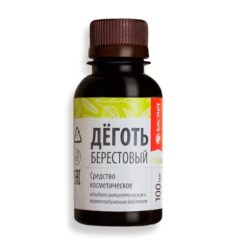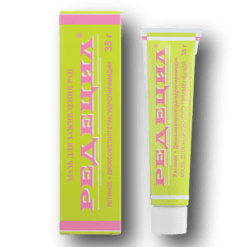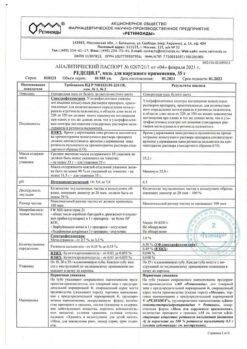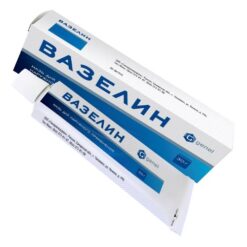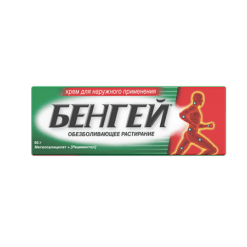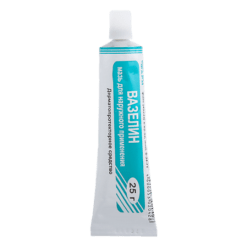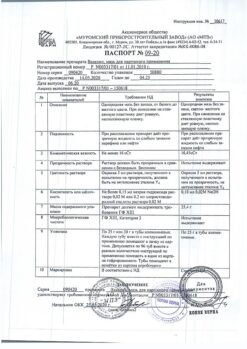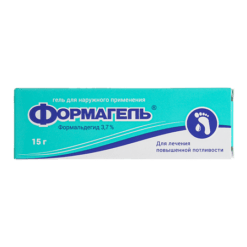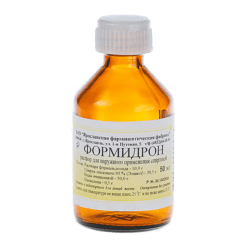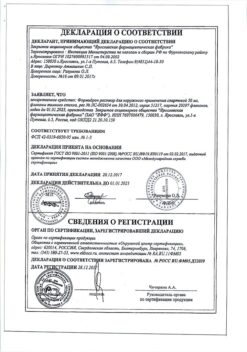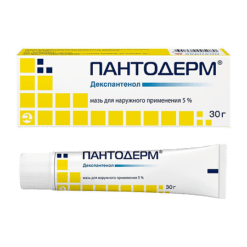No products in the cart.
Efleura syringe in autoinjector 60 mg/ml 1 ml, 2 pcs.
€1.00
Out of stock
(E-mail when Stock is available)
Description
Netakimab is a recombinant humanized monoclonal antibody that specifically binds interleukin-17A (IL-17A) found directly in tissues or in blood and other body fluids in therapeutic concentrations. IL-17A is a proinflammatory cytokine whose hyperproduction is predominantly due to the activation of Th17-lymphocytes. In the framework of the innate immunity IL-17A has a protective role.
In chronic immune inflammatory diseases pathological activation of Th17-lymphocytes and IL-17 hyperproduction stimulate T-cell response and increased production of other inflammatory mediators: IL-1, IL-6, tumor necrosis factor alpha (TNF-α), growth factors (G-CSF, GM-CSF) and various chemokines.
Netakimab has a high thermodynamic constant of specific binding to human IL-17A. According to preclinical studies, specific binding of netakimab in normal human tissues is limited to tissues of the lung, thymus, lymph node, tonsils, which is consistent with the data on the expression of IL-17 by cells of these tissues.
Administration of netakimab is not accompanied by statistically significant changes in the level of T-lymphocytes and has no effect on the level and the ratio of immunoglobulins of classes A, G and M.
Specific anti-inflammatory activity of netakimab was demonstrated in in vitro and in vivo tests. Netakimab dose-dependently inhibits IL-17 and TNFα-dependent production of interleukin-6 in cell culture at IC50 40 pM. In a model of collagen-induced arthritis in Javanese macaques (Macaca fascicularis), repeated (once a week for 4 weeks) subcutaneous injection of netakimab is accompanied by a decrease in the severity of inflammatory reaction in joints, which was confirmed by histological examination (articular cartilage remains intact, synovial membranes – without signs of lesions and inflammatory response, synoviocyte proliferation was not noted).
In psoriasis patients use of netakimab is accompanied with decrease of inflammation and hyperkeratosis in the skin, significant decrease of C-reactive protein and CRP level. In patients with active ankylosing spondylitis and psoriatic arthritis against the background of netakimab use there is a decrease of inflammation symptoms in the spine, entheses and joints, as well as a rapid decrease of C-reactive protein concentration, which is a marker of inflammation.
Indications
Indications
Efleira® is used in adults over 18 years of age:
• For the treatment of moderate to severe plaque psoriasis when systemic therapy or phototherapy is indicated.
• For the treatment of active ankylosing spondylitis with insufficient response to standard therapy.
• For the treatment of active psoriatic arthritis in monotherapy or in combination with methotrexate in case of insufficient response to standard therapy.
Pharmacological effect
Pharmacological effect
Netakimab is a recombinant humanized monoclonal antibody that, in therapeutic concentrations, specifically binds interleukin-17A (IL-17A), located directly in tissues or in blood and other biological fluids. IL-17A is a pro-inflammatory cytokine, the hyperproduction of which is mainly due to the activation of Th17 lymphocytes. IL-17A plays a protective role within the innate immune system.
In chronic immunoinflammatory diseases, pathological activation of Th17 lymphocytes and hyperproduction of IL-17 stimulates a T-cell response and increased production of other inflammatory mediators: IL-1, IL-6, tumor necrosis factor alpha (TNF-α), growth factors (G-CSF, GM-CSF) and various chemokines.
Netakimab has a high thermodynamic constant for specific binding to human IL-17A. According to preclinical studies, the specific binding of netakimab in normal human tissues is limited to the tissues of the lung, thymus, lymph node, and tonsils, which is consistent with data on the expression of IL-17 by cells of these tissues.
The use of netakimab is not accompanied by a statistically significant change in the level of T-lymphocytes and does not affect the level and ratio of immunoglobulins of classes A, G and M.
The specific anti-inflammatory activity of netakimab has been demonstrated in in vitro and in vivo tests. Netakimab dose-dependently inhibits IL-17 and TNFα-dependent production of interleukin-6 in cell culture with an IC50 of 40 pM. In a model of collagen-induced arthritis in cynomolgus macaques (Macaca fascicularis), repeated (once a week for 4 weeks) subcutaneous administration of netakimab is accompanied by a decrease in the severity of the inflammatory reaction in the joints, which is confirmed by histological examination (articular cartilage remains intact, synovial membranes – without signs of damage and inflammatory reaction, no proliferation of synoviocytes was noted).
In patients with psoriasis, the use of netakimab is accompanied by the extinction of inflammation and hyperkeratosis in the skin, a significant decrease in the level of C-reactive protein and ESR. In patients with active ankylosing spondylitis and psoriatic arthritis, with the use of netakimab, there is a decrease in symptoms of inflammation in the spine, entheses and joints, as well as a rapid decrease in the concentration of C-reactive protein, which is a marker of inflammation.
Special instructions
Special instructions
Driving vehicles and working with machinery
There is no data on the effect of Efleira® on the ability to drive vehicles and operate machinery.
Efleira® contains sodium
The sodium content of this drug is less than 1 mmol (23 mg) per single dose (120 mg), and the drug can be considered virtually “sodium-free.”
Active ingredient
Active ingredient
Netakimab
Composition
Composition
The active substance is netakimab.
Each syringe contains 60 mg of netakimab in 1 ml of solution (60 mg/ml).
Other ingredients (excipients) are: sodium acetate trihydrate, trehalose dihydrate, poloxamer 188, glacial acetic acid and water for injection.
Efleira® contains sodium.
Pregnancy
Pregnancy
If you are pregnant or breastfeeding, think you may be pregnant, or are planning a pregnancy, consult your doctor before starting to use the drug.
Do not use Efleira® during pregnancy. Women of childbearing potential and their sexual partners should use effective contraception during treatment with Efleira® and for at least 12 weeks after the end of treatment.
Do not use Efleira® while breastfeeding. To avoid negative effects on the baby, either breastfeeding or therapy with Efleira® should be discontinued.
Contraindications
Contraindications
Do not use Efleira®:
If you are allergic to netakimab or any of the other ingredients of this medicine (listed in section 6 of the leaflet). If you think you may have an allergic reaction, consult your doctor.
If you have clinically significant infectious diseases in the acute phase, including tuberculosis (see “Infections” below).
If you are pregnant or breastfeeding.
Special instructions and precautions
Before using Efleira®, consult your doctor.
If you experience symptoms during treatment that suggest an infection, you should contact your doctor immediately. Treatment with Efleira may potentially worsen chronic infections and increase the risk of infection. The presence of potentially serious infections such as HIV, active hepatitis B and/or C, syphilis, tuberculosis are contraindications for the use of netakimab. If you have a chronic infection or have had recurrent infections, or are in the early stages of recovery from a severe or moderate infection, tell your doctor.
If you currently have or have had inflammatory bowel disease (Crohn’s disease or ulcerative colitis), tell your doctor.
If you experience signs of allergic reactions while using Efleira®, you should immediately stop using the drug and consult a doctor. When using netakimab, allergic reactions are potentially possible.
Tell your doctor if you have an alcohol or drug addiction. If you have any of the listed conditions, your doctor will organize more careful monitoring of your health indicators and your compliance with the treatment schedule with Efleira®.
Tell your doctor if you have recently been vaccinated with live vaccines or are planning to be vaccinated. Some types of vaccines cannot be used during treatment with Eflaira®.
Tell your doctor if you are over 65 years old. Data on the effectiveness and safety of netakimab in patients over 65 years of age are limited.
Tell your doctor if you have kidney or liver disease. The effectiveness and safety of netakimab in this category of patients has not been fully studied.
Children and teenagers
Do not give Eflaira® to children and teenagers under 18 years of age because its effectiveness and safety have not been established.
Side Effects
Side Effects
Like all medicines, Efleira® can cause side effects, although not everyone gets them.
Stop using Efleira® immediately and get medical help if you experience any of the following side effects:
Possible infectious diseases, which may be accompanied by the following symptoms:
fever, flu-like symptoms, night sweats;
feeling tired, shortness of breath, prolonged cough;
fever, redness and tenderness of the skin, or a painful skin rash with blisters;
burning sensation when urinating.
A serious allergic reaction, symptoms of which may include:
difficulty breathing or swallowing;
low blood pressure, which may cause dizziness or lightheadedness;
swelling of the face, lips, tongue, or throat;
severe itching of the skin with a red rash or bumps.
Your doctor will decide whether it is possible to continue treatment.
Other possible adverse reactions that may occur when using Efleira®
Most of the following adverse reactions are mild or moderate. If any of these side effects become serious, tell your doctor, pharmacist, or nurse.
Common (may affect up to 1 in 10 people):
upper respiratory tract infections such as nasopharyngitis, pharyngitis, sinusitis;
a decrease in the content of white blood cells – leukocytes or one of their types – neutrophils, an increase or decrease in the content of another type of leukocyte – lymphocytes;
arterial hypertension (including if only systolic or diastolic pressure is increased);
increased blood glucose levels;
increased levels of bilirubin in the blood;
increased levels of liver enzymes: alanine aminotransferase (ALT), aspartate aminotransferase (AST);
increased cholesterol levels in a biochemical blood test;
positive results of a blood test for tuberculosis, positive results of intradermal diagnosis of tuberculosis.
Uncommon (may affect up to 1 in 100 people):
lower respiratory tract infections such as pneumonia, bronchitis;
urinary tract infection;
esophageal candidiasis, oral candidiasis;
inflammation of the mucous membrane of the eye (conjunctivitis);
herpes simplex;
tuberculosis infection;
skin infections (furuncle);
benign change in the mammary glands – fibroadenoma;
decreased levels of blood cells called platelets in the blood;
hypersensitivity reactions (allergic reactions);
headache;
dizziness;
spontaneously occurring sensations of burning, tingling, crawling (paresthesia);
inflammation of the facial nerve (neuritis);
episcleritis (inflammation of certain eye tissues);
abdominal pain;
diarrhea (frequent and/or loose stools);
skin rash, itching, urticaria, skin lesions called eczema, dermatitis;
increased protein content in the urine (proteinuria);
influenza-like illness*, local reaction**;
increased gamma-glutamyltransferase (GGT) in a biochemical blood test;
weight gain;
dizziness during the procedure (during injection).
Rare (may affect up to 1 in 1000 people):
inflammatory bowel diseases.
____________
*“Influenza-like illness” is characterized by the appearance of a number of symptoms similar to those detected with the flu or cold, including, for example, but not limited to: fever, chills, body aches, malaise, weakness, loss of appetite, dry cough, which are temporarily associated with the injection of the drug.
**Local reactions may include any adverse events occurring at the injection site.
Interaction
Interaction
Tell your doctor if you are using, have recently used, or may start using any other medications. This is because Efleira® may affect how some other medicines work. Some other medications may also affect how Efleira® works.
In particular, tell your doctor:
• have you ever taken drugs that affect your immune system, for example: methotrexate, sulfasalazine, leflunomide, hormonal drugs (prednisolone and its equivalents);
• if you have recently received or are about to receive vaccination. You should not receive certain types of vaccines while using Efleira®.
Overdose
Overdose
There are no clinical data on overdose.
The maximum tolerated dose for humans has not been established. In clinical studies, no dose-limiting toxicity was recorded: with subcutaneous administration of netakimab at a maximum dose of 3 mg/kg (195–355 mg for an adult weighing 65–85 kg), no pathological abnormalities were identified.
There is no specific antidote. Treatment is symptomatic.
Action
Action
Plaque psoriasis is a chronic disease that affects the skin and nails. In patients with psoriasis, the use of netakimab leads to a decrease in inflammation, skin clearing and a decrease in symptoms such as flaking, itching and pain.
Psoriatic arthritis is an inflammatory joint disease that can develop in patients with psoriasis; in some cases, psoriatic arthritis occurs before or at the same time as psoriasis. Netakimab therapy is associated with decreased signs and symptoms of arthritis (pain, joint swelling), improved physical function (ability to perform normal daily activities), and slowed joint damage.
Ankylosing spondylitis is an inflammatory disease that primarily affects the spine. The use of netakimab in patients with ankylosing spondylitis helps reduce signs and symptoms of the disease, such as pain, stiffness, and maintain spinal mobility.
If there is no improvement or you feel worse, you should consult a doctor.
Storage conditions
Storage conditions
Keep the drug out of the reach of children and so that the child cannot see it. Do not use Efleira® after the expiration date (shelf life) indicated on the carton and syringe label after the “best before” date.
The expiration date is the last day of the month.
Store in the refrigerator (2 – 8 °C). Do not freeze. Store in original cardboard packaging to protect from light.
Do not use the drug if you notice cloudiness of the solution, the presence of foreign visible particles in the drug, a change in color, or damage to any parts of the syringe.
Unused drug solution, used syringes, wipes/cotton swabs and other consumables must be disposed of using a closed, puncture-resistant sharps container made of plastic or glass. Do not store used syringes within the reach of children.
Do not throw away (pour) the drug down the drain. Ask your pharmacist how to dispose of (destroy) a drug that is no longer needed. These measures will protect the environment.
Manufacturer
Manufacturer
Biocad, Russia
Additional information
| Manufacturer | Biocad, Russia |
|---|---|
| Medication form | solution for injection |
| Brand | Biocad |
Related products
Buy Efleura syringe in autoinjector 60 mg/ml 1 ml, 2 pcs. with delivery to USA, UK, Europe and over 120 other countries.


